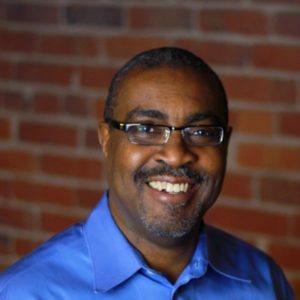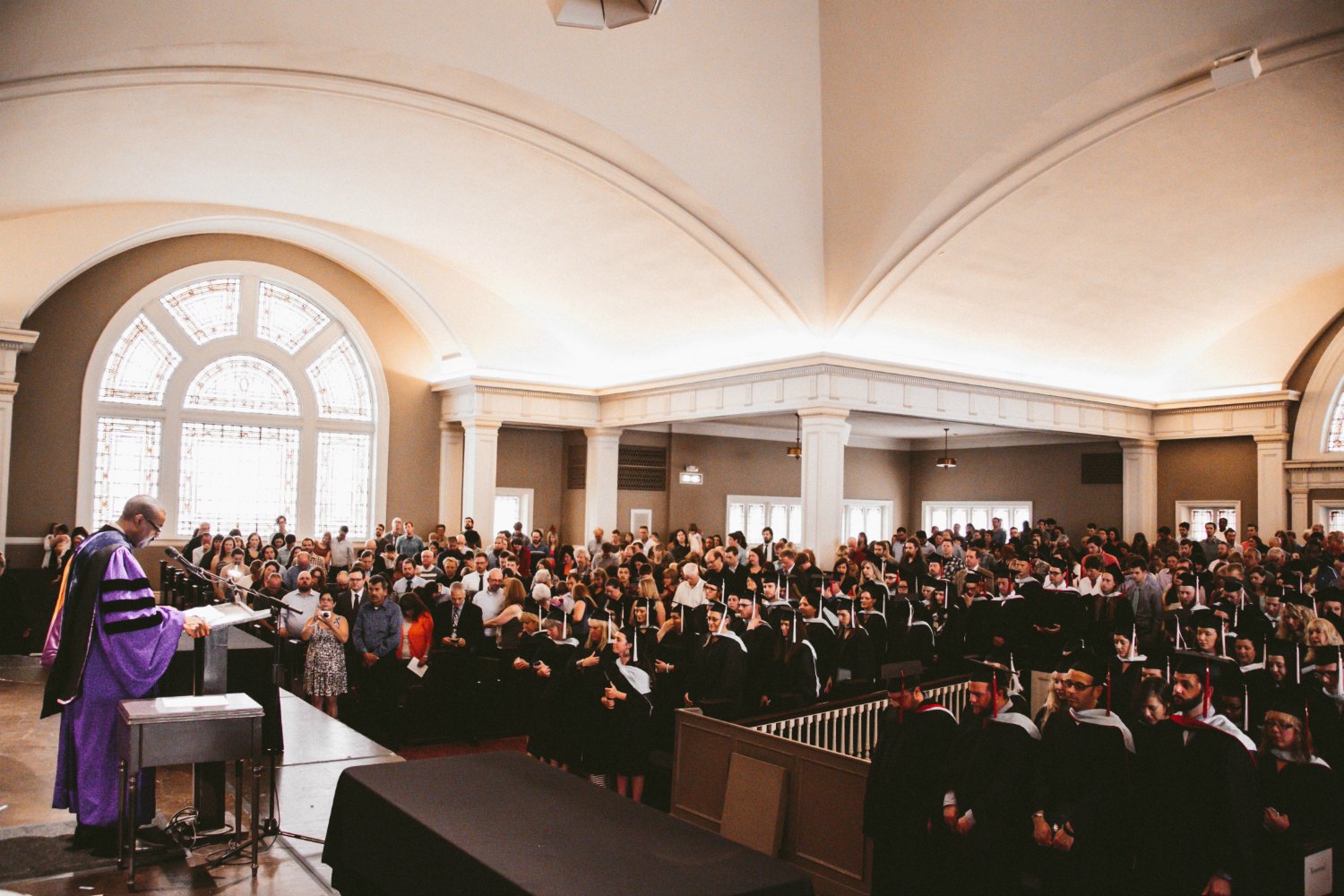The Seattle School of Theology & Psychology celebrated the end of the 2015-2016 academic year on June 25, gathering at Town Hall Seattle to honor the 71 students graduating from the MA in Counseling Psychology, MA in Theology & Culture, and Master of Divinity programs. The 18th annual Commencement ceremony was an opportunity for alumni, faculty, staff, current students, spouses, partners, friends, and families to all gather together to witness and celebrate the difficult and beautiful work of these graduating students.
“I represent hundreds of others, seen and unseen, who are here today to recognize a great achievement,” said Dr. Keith R. Anderson, President of The Seattle School, in his opening remarks.
During this year’s ceremony, the community took time to recognize, honor, and thank Dr. Caprice Hollins and Christie Lynk, both of whom are transitioning from their many years of service as core faculty into new positions as adjunct faculty, and Gina Waggoner, who is stepping down from her position as Practicum Director. The program also featured music by Puget Brass, a special vocal selection by Alex Zarecki (MATC), and the charge to graduating students by Dr. Anderson.
Bethany Bylsma (MA in Counseling Psychology), Steven Denler (MA in Theology & Culture), and Seth Thomas (Master of Divinity) were this year’s student speakers; we recently featured videos of each address on the Intersections blog. “Are you open to it, the heartbreak around you?” Bylsma asked her fellow graduates. “I want you to say yes. […] Say yes to love. It will cost you, but look at each other—you are not alone.”
Commencement is a pivotal moment in (S)ending, a season of events and conversations through which the Office of Students & Alumni guides students on the journey of becoming alumni, stepping into their vocational contexts, and continuing their lifelong study at the intersection of text.soul.culture.
At the same time, The Seattle School is marking the end of the 2015-2016 fiscal year, a season in which we pause, reflect on the past year and the year to come, and join with others in the work of multiplying transformation. Below, Dr. J. Derek McNeil, Vice President of Academics, writes about his six years at The Seattle School and reflects on what it means to mark the end of another year and to continue pursuing God in the work of transforming lives.
 Six years ago, when I first started as the Academic Dean, this school was in the middle of the name change from Mars Hill Graduate School to The Seattle School of Theology & Psychology. It was extremely valuable for me to listen and be a part of those early conversations, because they centered on the core values and aspirations of the school.
Six years ago, when I first started as the Academic Dean, this school was in the middle of the name change from Mars Hill Graduate School to The Seattle School of Theology & Psychology. It was extremely valuable for me to listen and be a part of those early conversations, because they centered on the core values and aspirations of the school.
It was a stimulating time of experimentation for the staff and faculty as we “tried on new names” and reimagined a school that would uniquely train therapists, artists, pastors, and social entrepreneurs to be agents of spiritual and social transformation. When the Board officially decided on our new name, we felt freed from the constraints of the old name, but I wondered if we could live into the potential of the new name’s promise.
Mars Hill Graduate School held the rich tradition of the pioneers who founded the school, but in our new name we declared the place and the mission to which we have been called. Our identity, or at least our aspirations, were no longer vague or veiled. We were definitively “The Seattle School,” called to engage the interdisciplinary challenge of integrating theology, psychology, and culture to serve the mission of Christ. Our name calls us forth into becoming more, in much the same way that we desire to call our students to become more.
The story of Jacob’s wrestling and conversion in the biblical text reveals this potential to become something more in the moment of renaming. For Jacob, life had reached an anguishing plateau; the trickery and coping he had used to prosper and progress through life had brought him to a moment of reckoning. He was told by God to return to his homeland and family so that God would do him good, but he was fearful, knowing the animosity that he left home to escape. He had devised a plan to appease the family honor and negotiate the sibling rivalry that threatened all he held dear, but he was not convinced it would work.
Night falls and Jacob finds himself alone, wrestling with the divine. Injured and crippled from the violence, his realization with whom he is battling and his persistence in this struggle draw out the favor of God. He is then given a name that gives perspective to his history and greater purpose to his future.
The renaming was not the end of of his story, but the freedom to continue the story into a new future he could not fully envision until he crossed the threshold of his ordeal.
I’ve shared this story of Jacob’s renaming with The Seattle School’s Instructional team, as we’ve talked about living into the promise of our name. It is easy to assume that the change of a name means instantaneous transformation of one’s character, or in this case Jacob’s trickster nature. Reading a few chapters ahead, Jacob and his sons struggle with letting go of the ways with which they had operated in order to live into their new identity and call, but it is in reading backwards that we understand why he holds to a promise of goodness that came in a dream.
Over the last four years, the Academic side of this institution has also wrestled toward life and persistently pursued our calling. Our wrestling is not in pursuit of a different dream, but an attempt to fulfill the identity toward which God has called us. We continue to emphasize the importance of formation, self-awareness through the use of story, and the centrality of relationship.
More recently, we have restructured the common core, reviewed our Master of Divinity program, developed the Master of Theology & Culture program with three distinct tracks, engaged three new accrediting processes, identified the threshold concepts of our learning model, and hired three new faculty members.
This coming year also promises to be a year of expansion, as we enter the world of podcasts, eCourses, and extending the classroom by offering dynamic training and content digitally.
We deeply believe you are a provision from God to help us fulfill the dream we have been called towards and are grateful for your partnership. We could not be who we are without you, and we cannot become more without your continued support.

